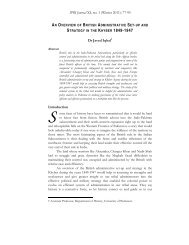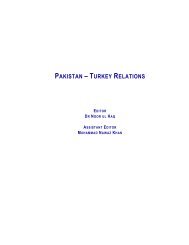120 Whither Kashmir? (Part II) - Islamabad Policy Research Institute
120 Whither Kashmir? (Part II) - Islamabad Policy Research Institute
120 Whither Kashmir? (Part II) - Islamabad Policy Research Institute
You also want an ePaper? Increase the reach of your titles
YUMPU automatically turns print PDFs into web optimized ePapers that Google loves.
<strong>Whither</strong> <strong>Kashmir</strong>?<br />
To a question, he said that Pakistan and India had old rivalry on<br />
<strong>Kashmir</strong>, which has caused unrest among millions of the people across<br />
the world. The inter-state disputes must be settled peacefully and the<br />
people of <strong>Kashmir</strong> must be given the right to live in peace and to find<br />
opportunities to make progress, he maintained. The Saudi deputy<br />
minister will hold a number of meetings with important people before<br />
returning home early next week.<br />
75<br />
Muhammad Saleh Zaafir, The News (<strong>Islamabad</strong>), March 19, 2010.<br />
http://www.thenews.com.pk/daily_detail.asp?id=229896<br />
CONCLUSION<br />
The preceding study shows that the <strong>Kashmir</strong> dispute involves a large<br />
number of legal issues relating to questions of accession, aggression, selfdetermination<br />
and status of UN resolutions. The question arises whether<br />
or not the dispute in question can be approached from the juridical angle<br />
for conflict resolution. The answer to this question is to be found<br />
principally in the attitude of India and Pakistan towards its submission to<br />
the adjudicative process. Both have so far shied away from submitting the<br />
dispute to the World Court for judicial settlement or for arbitration by<br />
an arbitral body. Thus, when hostilities broke out between the two<br />
countries in <strong>Kashmir</strong> in 1947, the British Prime Minister Clement Attlee<br />
proposed to the Pakistan Government to refer the dispute to the World<br />
Court but the proposal did not find favour with the latter. Pakistan's<br />
attitude was again not encouraging when a European Union delegation<br />
proposed in the summer of 1997 for the submission of the dispute to the<br />
World Court. As far as India is concerned, as shown in the present study,<br />
she has never felt comfortable with the idea of the third party<br />
involvement including the World Court in her disputes with Pakistan.<br />
During the period the Security Council was actively seized of the matter<br />
the latter never deemed it appropriate to seek an advisory opinion from<br />
the World Court. Had it done so, the handling of the dispute, as observed<br />
by Joseph Korbel, would have been easier because "one of the parties<br />
would then have been in the wrong, and the Council would in turn have<br />
had a stronger moral and political position for the recommendation of<br />
appropriate measures". Unlike India, Pakistan has, however, shown<br />
flexibility by agreeing to selectively avail herself of the services of the<br />
Court. For example, on 21 February 1951, Great Britain and the United<br />
States proposed a resolution in the Security Council which, inter alia,




